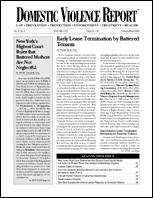Federal District Courts Split on Constitutionality of VAWA Civil Rights Remedy
Author: Julie Goldscheid.; Pamela Coukos.; Joan Zorza.
Source: Volume 02, Number 01, October/November 1996 , pp.1-2(2)

next article > |return to table of contents
Abstract:
Women are beginning to use the Violence Against Women Act’s (VAWA) ground breaking civil rights remedy to recover damages from injuries they suffer as a result of gender biased violence, such as domestic violence, rape and sexual assault. At least two defendants have challenged the remedy’s constitutionality in federal court, with opposite results. Both defendants have relied upon the U.S. Supreme Court decision, U.S. v. Lopez, 115 S. Ct. 1624 (1995), that found unconstitutional the Gun-Free School Zones Act of 1990. The Supreme Court held that Congress impermissibly enacted that law under the Constitution’s Commerce Clause because there was insufficient connection between gun possession in schools and interstate commerce. In Doe v. Doe, 929 F. Supp. 608 (D. Conn. 1996), the first constitutional challenge of the new civil rights tort remedy for gender motivated violence, Connecticut District Court Judge Janet Bond Arterton refused to dismiss the wife’s case on June 20, 1996. In contrast, on July 29, 1996, U.S. District Court Judge Jackson L. Kisser dismissed a woman’s VAWA claims based on a brutal gang rape by two fellow students who were football players, in Brzonkala v. Virginia Polytechnic, et al., 22 Fam. L. Rptr. 1451, (W.D. Va. 1996).These cases are discussed here.Keywords: Wisconsin v. Mitchell
Affiliations:
1: NOW Legal Defense and Education Fund; 2: NOW Legal Defense and Education Fund; 3: Editor, Domestic Violence Report.